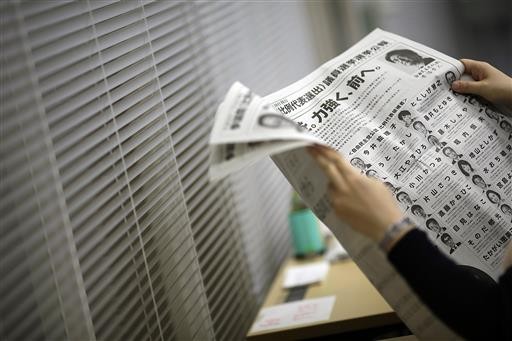Popular Reads
Top Results
Can't find what you're looking for?
View all search resultsPopular Reads
Top Results
Can't find what you're looking for?
View all search resultsJapan's vote opens door to constitution change
Change text size
Gift Premium Articles
to Anyone
A
resounding election victory for Japanese Prime Minister Shinzo Abe's ruling bloc has opened the door a crack for his long-cherished ambition to revise the constitution for the first time since it was enacted in 1947 — a behind-the-scenes agenda that could over time change Japan's future.
Gains in parliamentary elections Sunday mean that Abe's ruling Liberal Democratic Party, with the help of coalition partner Komeito and fringe groups supporting constitutional change, now can cobble together the crucial two-thirds majority in the 242-member upper house needed to propose revision and put it to a referendum.
The LDP and Komeito already have a two-thirds majority in the lower house. Holding a so-called "supermajority" in both houses is rare, and the LDP's long-term goal of constitutional revision has never seemed so realistic.
Once the excitement subsides, however, the road to constitutional revision remains long and difficult. Fundamental change is unlikely in the remaining two years in Abe's premiership, though he may angle for another three-year term. But if Abe sets his sights low, he may be able to win approval for a modest revision that could lay the groundwork for deeper change later.
Abe told a parliamentary session in March that he was hoping to achieve a revision during his term, which expires in September 2018, but he hasn't said specifically what change he would seek. After the election victory, he seems game to test the waters.
"We will move on to a next stage and start discussing which articles should be revised and in what way," Abe said late Sunday, saying he would launch a parliamentary research committee.
As a grandson and admirer of Nobusuke Kishi, a former prime minister who despised the US-drafted constitution, rewriting the charter is an important goal for Abe. For Abe's Liberal Democratic Party, the 1947 charter is the legacy of Japan's war defeat and an imposition of the victors' world order and Western values.
Japan's postwar constitution renounces the use of force in international conflicts, and limits its military to self-defense only, although Japan has a well-equipped modern army, navy and air force that work closely with the US, Japan's top ally.
Abe's government adopted a new interpretation of the war-renouncing Article 9 in 2014 so Japan can take on a bigger military role internationally, and parliament enacted a set of security laws last year to allow Japan to defend also the US and other allies in certain circumstances.
Some Japanese agree with Abe's views on security because of growing fears about terrorism, North Korea's missile and nuclear weapons ambitions and China's military assertiveness, while others appreciate the charter as a symbol of postwar democracy and take pride in the war-renouncing pledge.
Besides Article 9, the ruling party proposed changes in a 2012 draft revision that would restore pre-war traditions and family values centered on the emperor, and to balance the national interest with the constitution's "basic human rights."
That kind of fundamental revision would be difficult to get through parliament, not to mention win approval in a referendum. The LDP would have to win over Komeito, a Buddhist-backed party not keen on that kind of change, or it would have to find other supporters in parliament.
Stephen Nagy, a professor of international politics at International Christian University in Tokyo, writes that "despite a two-thirds majority in the upper house, constitutional revision is unlikely," citing public support for the pacifist constitution and divided views on both revision and legislative priorities within the ruling party.
"Lawmakers are interested in prioritizing economic growth and a bolder commitment to structural reform instead of wasting valuable political capital on changing Article 9 of the Constitution," Nagy said in an online article for the Asia and Pacific Policy Society.
The LDP's election success largely reflects the choice of Japanese voters for stability and a lack of opposition alternatives, rather than an endorsement of constitutional change.
Many voters said in exit polls they were unaware of the significance of a two-thirds majority, suggesting their disinterest in the revision issue.
Abe could decide to pursue a less controversial change. Komeito, for example, prefers the addition of privacy and other rights to adapt the charter to societal changes since 1947, rather than revisions to the existing language.
There is also growing speculation that Abe may seek an extension as party leader, though LDP leaders generally step down after two terms to give a chance to others.
"If he can continue another three years, which is until September 2021, then he might be able to accomplish the amendment. On top of that he can welcome the Olympic Games in 2020 as prime minister," said freelance political analyst Takao Toshikawa. "Perhaps that's his ambition, even though he doesn't openly talk about it."
Asked about the possibility at a post-election news conference Monday, Abe didn't comment one way or the other. Ultimately, it would depend on whether he can cement his grip on power within the party, and persuade his colleagues to grant him an unusual third term.










